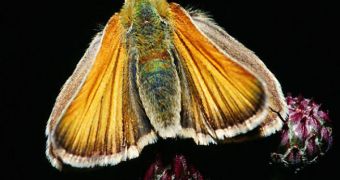With the number of species that will go extinct over the next few years in mind, researchers at the Durham and York Universities have decided to try a new approach to saving them, by something they call “assisted colonization.” Basically, this is the process of artificially transplanting the creatures from one location to another, while at the same time helping them survive in their new habitats. For the trials, the team of biologists has used butterflies, so as to get clues of what habitat changes do to them.
For the new research, which has been recently published in the journal Conservation Letters, the Durham University and the University of York collaborated have with scientists from the University of Leeds, the Center for Ecology and Hydrology, and the Butterfly Conservation, in re-locating butterflies captured in North Yorkshire to abandoned quarries.
Normally, they wouldn't have been attracted by such locations, but, as it turns out after 8 years of close monitoring, they have adapted incredibly well to their new homes, and even thrived there.
“The success of the assisted colonization demonstrates for the first time that moving species to areas identified as newly climatically-suitable can play a role in wildlife conservation. This is likely to be especially important for rare species and for those species that experience difficulty in crossing areas of unfavorable habitat. The results show that, although areas in the north are becoming suitable for a wider range of butterflies, shifts in butterfly distributions are lagging behind climate change because many species have limited mobility or struggle to cross large distances between sites offering suitable habitat,” Durham University researcher professor Brian Huntley says.
According to the new study, urban and rural development policies need to be thought over, so as to offer such endangered species at least the slightest chance of being able to adapt to the alterations brought forth by climate change. In the past, as the planet went through various warm or cold spells, the animals were able to adapt because they had the world to themselves, but now man's influence is just too much for them to handle.
“Britain's butterflies are in steep decline largely due to the destruction and fragmentation of their habitats by human activity such as intensive farming and forestry, and urban development. The warming climate that Britain has experienced over the past few decades should have been a blessing for butterflies, but in reality few have benefited,” Butterfly Conservation Surveys Manager Richard Fox argues.
“Research, using millions of butterfly sightings collected by our volunteer observers, has suggested that even those butterflies that have spread northwards and colonized [a] new territory as a result of climate change, have been held back by lack of habitat to act as stepping stones or green corridors. As climate change accelerates, more and more species will be threatened by it,” he concludes.

 14 DAY TRIAL //
14 DAY TRIAL //